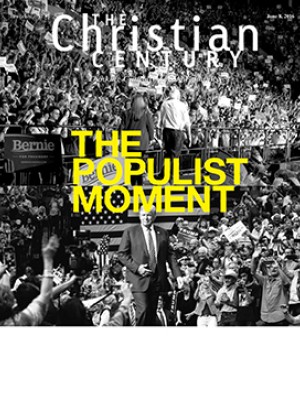Racial justice programming in many mainline churches focuses on privilege, power
Last year when the death of Freddie Gray and resulting unrest in Baltimore filled the news, Kathy Dwyer felt she had to do something.
“Every time I turned on the TV, I just felt like I was getting punched in the gut,” said the white pastor of a predominantly white United Church of Christ congregation in Arlington, Virginia.
In the wake of the continuing deaths of African Americans at the hands of police officers, some white church leaders say they can no longer check off their racial justice to-do list by hosting a Black History Month event. Instead, they are holding workshops that address issues such as the disparate treatment white people and people of color receive.
Dwyer’s church started a yearlong racial justice conversation and posted a Black Lives Matter sign, which was vandalized. Members began reading books such as The New Jim Crow and Between the World and Me to better understand white privilege. And they invited people of color to speak at “sacred suppers” about their experiences with discrimination.
Read our latest issue or browse back issues.
Leonard L. Hamlin Sr., a black pastor of a National Baptist Convention, USA, congregation in Arlington, said speaking at Dwyer’s church was different from many of the times he has explained his experiences to others.
“You had persons who really wanted to hear it,” he said, “persons who gave more time for it.”
At the Ecumenical Advocacy Days conference in April, about 60 people gathered in suburban Washington, D.C., for a session called “Face to Face with Racism.”
Facilitators Pam Nath, who is white, and Yvonne Platts, who is black, used the image of an iceberg: oppressive power is like the tip, with white power looming underneath.
“The stuff that’s hidden below the surface is bigger and more powerful and more dangerous than the stuff we can see above the waters,” said Nath, who works with Platts in the group Roots of Justice.
At a later point in the workshop, they led a role-playing exercise about power, in which a black woman depicted Jesus and a white man took the part of Jairus, a synagogue leader who sought Jesus out to heal his daughter.
“How are they addressing oppressive power—in the places you work and more particularly the places where you worship?” Platts asked.
While there have been past instances of white people addressing racial justice, the focus on white privilege seems sharper now, propelled in part by the Black Lives Matter movement.
“Most of us don’t think about our whiteness until something brings it to our attention,” said Kevin Skwira-Brown, a white facilitator of “Cracking the Shell of Whiteness,” a six-week class held earlier this year at Peace United Church of Christ in Duluth, Minnesota.
It’s important for white people to remain humble, rather than being “filled with pride because they see something they didn’t see six weeks ago or six months ago,” he said. “And that’s part of the challenge, is to recognize how much we have to learn.”
Cheryl Sanders, professor of Christian ethics at Howard University School of Divinity, said white privilege and white supremacy have long been discussed on the campus of her predominantly black school and in other black settings. But she welcomes the attention to them from white allies.
“To do so will make a big difference as the ascendancy of Donald Trump forces the issue upon us, that is, to acknowledge and repudiate systems that validate white male dominance while denigrating the claims and humanity of others,” she said.
Also in April, the World Council of Churches sent a racial justice delegation to visit Charleston, South Carolina; Ferguson, Missouri; and Chicago. The WCC Central Committee will consider the delegation’s report at its June meeting.
“We had heard that racism continues to be an issue in the United States,” said Agnes Abuom, the delegation head, from the Anglican Church of Kenya. “But we did not expect to find it so deep, so wide, and so pervasive.” —Religion News Service; added sources
This article was edited on May 24, 2016.




